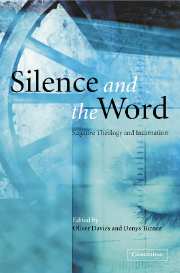Book contents
- Frontmatter
- Contents
- Notes on contributors
- Preface
- Introduction
- 1 Apophaticism, idolatry and the claims of reason
- 2 The quest for a place which is ‘not-a-place’: the hiddenness of God and the presence of God
- 3 The gift of the Name: Moses and the burning bush
- 4 Aquinas on the Trinity
- 5 Vere tu es Deus absconditus: the hidden God in Luther and some mystics
- 6 The deflections of desire: negative theology in trinitarian disclosure
- 7 The formation of mind: Trinity and understanding in Newman
- 8 ‘In the daylight forever?’: language and silence
- 9 Apophasis and the Shoah: where was Jesus Christ at Auschwitz?
- 10 Soundings: towards a theological poetics of silence
- Select bibliography
- Index
1 - Apophaticism, idolatry and the claims of reason
Published online by Cambridge University Press: 22 September 2009
- Frontmatter
- Contents
- Notes on contributors
- Preface
- Introduction
- 1 Apophaticism, idolatry and the claims of reason
- 2 The quest for a place which is ‘not-a-place’: the hiddenness of God and the presence of God
- 3 The gift of the Name: Moses and the burning bush
- 4 Aquinas on the Trinity
- 5 Vere tu es Deus absconditus: the hidden God in Luther and some mystics
- 6 The deflections of desire: negative theology in trinitarian disclosure
- 7 The formation of mind: Trinity and understanding in Newman
- 8 ‘In the daylight forever?’: language and silence
- 9 Apophasis and the Shoah: where was Jesus Christ at Auschwitz?
- 10 Soundings: towards a theological poetics of silence
- Select bibliography
- Index
Summary
The revival of interest in our times, not alone within theology, but pursued with equal intensity within literary and cultural theory, in the ancient topic of the ‘apophatic’, no doubt has its explanations within the intellectual history of Western culture. But it is no purpose of this essay to explore them. My starting point is rather in one of the principal issues with which a number of those engaged in this rediscovery are explicitly preoccupied, whether or not they themselves avow consciously theological interests: and that issue is the question of what it is exactly that is being denied when it is said by the atheist that there is no God.
It is some time now since it could be supposed without challenge by the intellectual and cultural elites of Western society that there is no question of God, that nothing hangs on whether there is or is not a God, for nothing follows either way, though it is a fair guess that for very large sectors of the populations of Western countries, life is lived broadly in a mental condition of indifference to the matter. And it is true that, even among the intellectual elites, for many of whom it is fashionable to permit theism as an option within a generalised relativism of thought (for which there can be no grounds for ruling out any beliefs anyway) the licence granted to theism can seem to amount to no more than a higher indifferentism.
- Type
- Chapter
- Information
- Silence and the WordNegative Theology and Incarnation, pp. 11 - 34Publisher: Cambridge University PressPrint publication year: 2002
- 4
- Cited by

